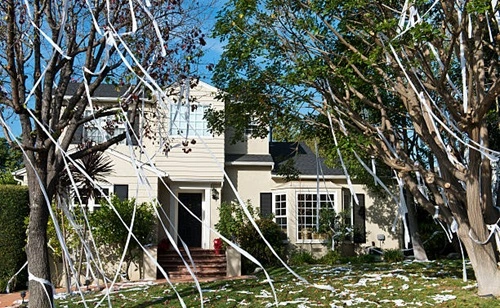Yes, toilet papering someone’s house, commonly known as “TPing,” can be illegal depending on the circumstances and location. While often seen as a harmless prank, this act may violate laws related to trespassing, vandalism, or littering, potentially resulting in fines, community service, or even criminal charges.
The Legal Perspective on Toilet Papering
Toilet papering a house involves throwing rolls of toilet paper over trees, roofs, or other parts of someone’s property. Although it may be intended as a playful gesture, TPing can lead to legal consequences depending on how it is viewed by the property owner and local authorities.
1. Potential Laws Violated
Trespassing
Trespassing laws make it illegal to enter someone’s property without permission.
- If individuals enter the property to throw toilet paper, they could be charged with criminal trespass.
- Example: Under California Penal Code § 602, entering another person’s property without consent, even for a prank, can result in misdemeanor charges.
Vandalism
Vandalism laws prohibit damaging or defacing property.
- Even though toilet papering typically doesn’t cause permanent damage, it may still be classified as vandalism if cleanup costs are involved.
- Example: Under Texas Penal Code § 28.03, vandalism causing any property alteration without consent is a punishable offense.
Littering
In many states, toilet papering may be considered littering, especially if toilet paper ends up on the ground or in public spaces.
- Example: In Florida, littering laws under Statute § 403.413 prohibit throwing waste materials onto someone else’s property or public areas.
2. The Role of Intent
The intent behind the act can influence its legal treatment:
- Harmless Prank: If the property owner views TPing as a lighthearted joke and no significant damage occurs, law enforcement may choose not to pursue charges.
- Malicious Intent: If the act is intended to harass, intimidate, or embarrass, it may lead to harsher consequences, including charges of harassment or criminal mischief.
Consequences of Toilet Papering
If reported, toilet papering can result in various legal and non-legal consequences:
1. Fines and Restitution
- Fines for trespassing, vandalism, or littering can range from $50 to $5,000, depending on the jurisdiction and severity of the act.
- Courts may require offenders to pay for cleanup costs.
2. Community Service
Judges often assign community service for minor offenses like TPing, particularly for juvenile offenders.
3. Criminal Record
Repeated or malicious incidents of toilet papering could result in misdemeanor or even felony charges, leading to a permanent criminal record.
4. Civil Lawsuits
Property owners may file a civil lawsuit to recover damages for cleanup or repairs caused by TPing.
When Toilet Papering Might Be Permissible
1. Consent from the Property Owner
If the homeowner is aware of and consents to the act (e.g., as part of a friendly neighborhood rivalry), it’s unlikely to lead to legal issues.
2. Designated Areas
Some communities may tolerate TPing during specific events, like Halloween or school rivalries, as long as it doesn’t cause damage or disrupt public order. However, participants should still check local regulations.
Recent Legal Developments (2023-2024)
1. Stricter Enforcement of Harassment Laws
Several states, including New York and California, have introduced stricter penalties for pranks that involve trespassing or vandalism, especially if they are targeted at individuals repeatedly.
2. Anti-Bullying Campaigns
Increased awareness of bullying and harassment has led schools and communities to discourage pranks like TPing, particularly when directed at vulnerable individuals.
3. Enhanced Community Policing
Communities are focusing on public awareness campaigns to reduce pranks that escalate into property damage, emphasizing alternatives to TPing.
FAQs About Toilet Papering Someone’s House
Q1. Is TPing considered vandalism?
Ans: Yes, in many jurisdictions, TPing can be considered vandalism, especially if it results in cleanup costs or property damage.
Q2. Can I get arrested for TPing someone’s house?
Ans: Yes, depending on local laws and the severity of the act, you could be arrested or cited for trespassing, vandalism, or littering.
Q3. What are the penalties for toilet papering?
Ans: Penalties vary but can include fines, community service, restitution for cleanup costs, and, in some cases, a criminal record.
Q4. Is it illegal to TP someone’s house during Halloween?
Ans: While TPing may be more socially tolerated during Halloween, it is still illegal if it involves trespassing, littering, or property damage.
Q5. What should I do if my house is TP’d?
Ans: Contact local authorities if you believe the act was malicious. Otherwise, document the incident and request assistance with cleanup from the individuals involved if known.


